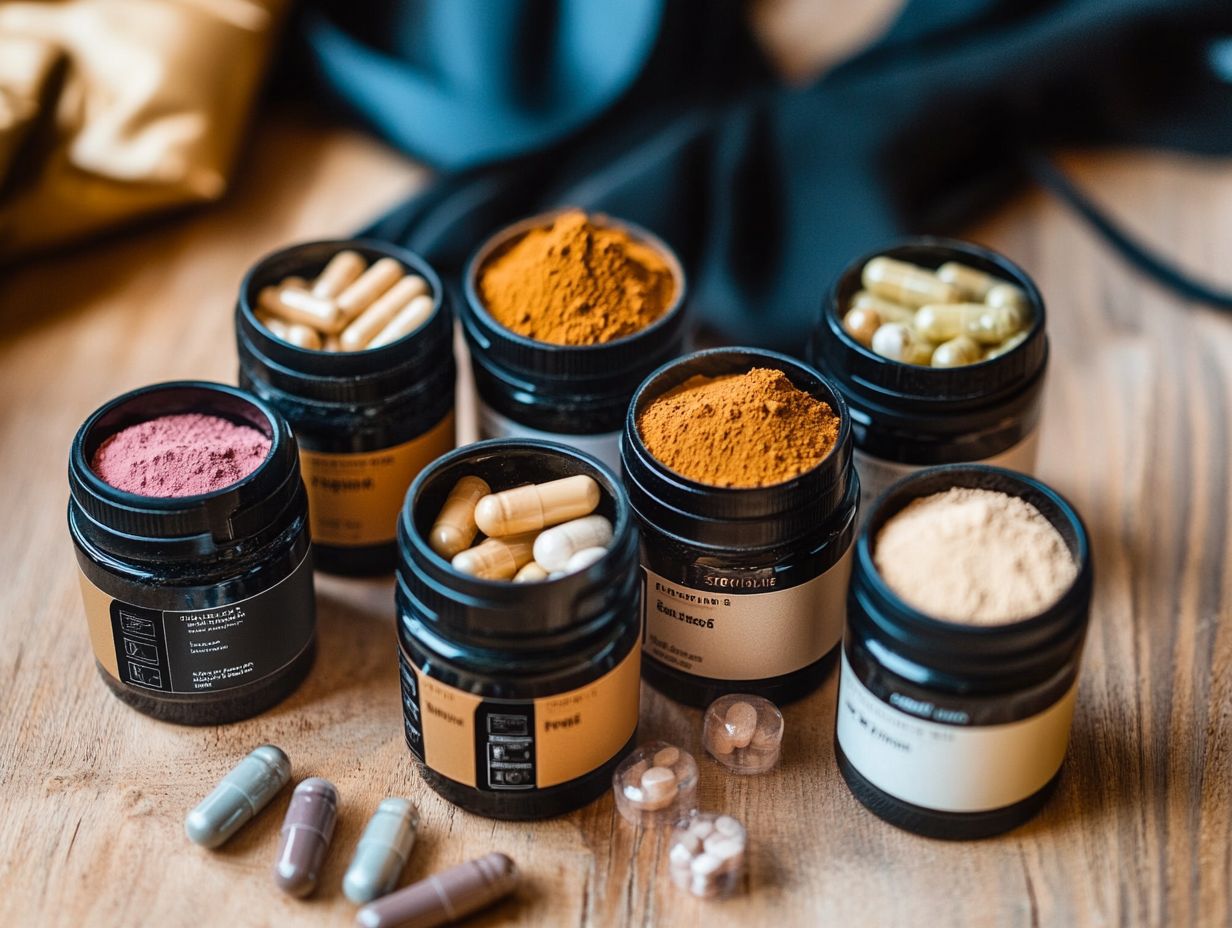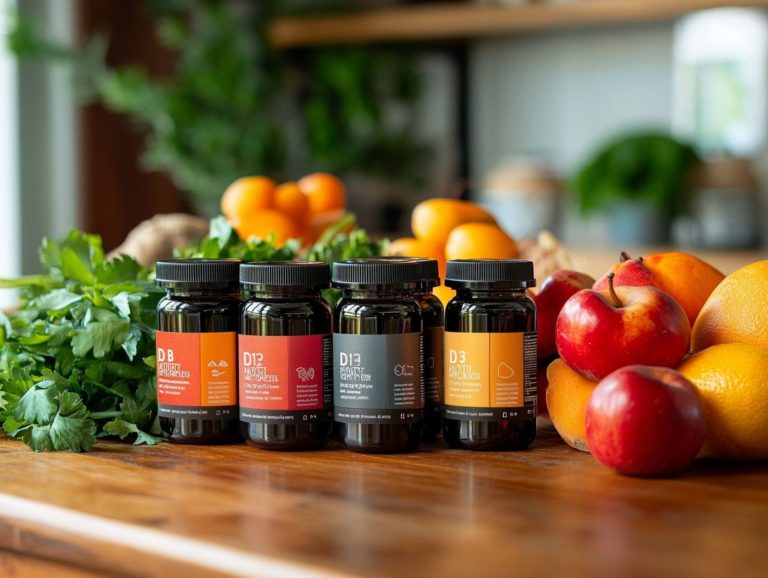Top 7 Dietary Supplements for Athletes
In the fiercely competitive realm of sports, athletes continually seek avenues to boost performance and accelerate recovery. Dietary supplements can be pivotal in reaching these objectives.
This article delves into the top seven dietary supplements favored by athletes, including creatine, protein powders, and fish oil. It outlines their benefits, mechanisms, and crucial guidelines for safe usage.
Whether you’re a seasoned professional or just embarking on your athletic journey, understanding these supplements can seriously take your game to the next level!
Contents
- Key Takeaways:
- 1. Creatine
- 2. Protein Powders
- 3. BCAAs (Branched-Chain Amino Acids)
- 4. Glutamine
- 5. Beta-Alanine
- 6. Fish Oil
- 7. Vitamin D
- What Are Dietary Supplements and Why Do Athletes Use Them?
- What Are the Benefits of Creatine for Athletes?
- How Can Protein Powders Help with Muscle Growth and Recovery?
- What Are BCAAs and How Do They Benefit Athletes?
- How Does Glutamine Aid in Muscle Recovery and Immune Function?
- What Are the Performance Benefits of Beta-Alanine for Athletes?
- Why Is Fish Oil Important for Athletes?
- What Are the Benefits of Vitamin D for Athletes?
- What Are the Potential Risks and Side Effects of These Supplements?
- How Can Athletes Determine the Right Dosage and Timing for These Supplements?
- What Are Some Other Important Considerations When Taking Dietary Supplements as an Athlete?
- Frequently Asked Questions
- What are the top 7 dietary supplements for athletes?
- Why are these dietary supplements beneficial for athletes?
- How should athletes choose which supplements to take?
- Are there any risks associated with taking dietary supplements?
- Can dietary supplements replace a healthy diet for athletes?
- Should athletes take supplements before or after workouts?
Key Takeaways:

- Creatine boosts muscle strength and power. Follow recommended dosages and stay hydrated to maximize benefits.
- Protein powders are key to muscle growth and speedy recovery. Vary protein sources and consult with a doctor or dietitian for individual needs.
- BCAAs help reduce muscle soreness and enhance recovery during intense exercise but should not replace a well-rounded diet.
1. Creatine
Creatine stands out as a highly researched supplement, earning its place as a favorite among athletes. Its ability to enhance muscle strength and boost performance during high-intensity training sessions is impressive.
This compound plays a crucial role in improving muscle contraction efficiency, making it a staple in training programs designed to maximize your athletic potential.
The magic of creatine lies in its capacity to replenish ATP, the body’s main source of energy. This replenishment allows for sustained energy output during demanding physical activities. Creatine also encourages greater water retention in muscle cells, leading to improved hydration and possibly faster recovery between workouts.
Many athletes report significant gains in performance across activities such as sprinting, weightlifting, and high-intensity interval training. For optimal results, a daily dosage of 3 to 5 grams is typically advised, ideally taken post-workout to enhance absorption and effectiveness.
This approach helps you tap into your training potential.
2. Protein Powders
Protein powders are essential supplements for athletes aiming to elevate muscle growth and refine your recovery after demanding training sessions. These powders offer a convenient source of high-quality protein, crucial for meeting your daily protein requirements and ensuring a steady supply of amino acids for muscle repair.
Among the wide array of options available, whey protein stands out due to its rapid absorption rate, making it an excellent choice for post-workout recovery. On the other hand, casein provides a slow and steady release of amino acids, offering sustained support during longer fasting periods, such as overnight.
If you lean towards plant-based nutrition, options like pea, brown rice, and hemp protein can effectively promote muscle synthesis while accommodating your dietary preferences.
Each of these selections plays a vital role in enhancing your recovery and optimizing your performance, allowing you to customize your supplementation to meet your unique needs.
3. BCAAs (Branched-Chain Amino Acids)
BCAAs, or branched-chain amino acids, are essential supplements for athletes. They play a crucial role in reducing muscle soreness and enhancing overall performance. Comprising leucine, isoleucine, and valine, these amino acids are vital for muscle protein synthesis and can significantly aid your post-exercise recovery.
Each of these BCAAs serves a unique function: leucine stimulates muscle growth, isoleucine supports energy production, and valine contributes to muscle repair. The optimal ratio often recommended is 2:1:1, focusing on leucine to maximize its anabolic effects.
Timing your BCAA intake whether before or after a workout can lead to enhanced endurance, improved recovery rates, and reduced exercise-induced fatigue. Incorporating BCAAs into your regimen helps you recover quicker and develop stronger, more resilient muscles over time.
In conclusion, understanding and properly utilizing these dietary supplements can greatly impact your training and performance. Always consider consulting with a professional for personalized advice tailored to your specific needs.
4. Glutamine
Glutamine is an important amino acid that your body might need more of during certain times. It offers many benefits, especially for athletes focused on muscle recovery and immune health.
This amino acid helps repair muscle tissue after tough workouts and boosts your immune response. It also replenishes energy reserves in your muscles and alleviates muscle soreness.
For optimal results, consider supplementing with 5 to 10 grams post-exercise, ideally within 30 minutes for maximum absorption. You can also get glutamine from natural sources like chicken, fish, eggs, and dairy products.
Incorporating these foods into your post-workout meal can further enhance your recovery and immune support, helping you maintain peak performance.
5. Beta-Alanine
Beta-alanine is a go-to amino acid supplement for athletes seeking to elevate muscle endurance and fend off fatigue. It helps you gain a competitive edge during intense training sessions.
By buffering lactic acid buildup in your muscles, beta-alanine boosts your performance in high-intensity activities. This makes it beneficial for both strength and endurance athletes.
Higher levels of carnosine, formed when beta-alanine pairs with histidine, help regulate pH levels in muscle cells. This allows you to sustain peak performance for longer periods.
Take a daily dose of 3 to 6 grams for the best results. You might notice a harmless tingling feeling, which is normal. Integrating this supplement can significantly enhance your overall performance.
6. Fish Oil

Fish oil is an essential dietary supplement packed with omega-3 fatty acids, known for their powerful anti-inflammatory properties. These benefits are particularly advantageous for athletes, helping to support joint health and overall immune function.
By adding fish oil to your routine, you can manage inflammation from intense training and enhance your recovery process. Omega-3 fatty acids, especially EPA and DHA, reduce inflammation markers, leading to less muscle soreness and quicker recovery times.
If you re considering incorporating fish oil into your routine, a daily dose of 1,000 to 2,000 mg is often suggested, but it s best to consult with a healthcare professional. You can also boost your omega-3 intake through dietary sources like fatty fish salmon, mackerel, and sardines as well as plant-based options like flaxseeds and walnuts.
7. Vitamin D
Vitamin D is a crucial nutrient that significantly impacts your immune health. It also plays a vital role in enhancing muscle strength. For athletes like you, maintaining adequate levels of vitamin D is essential for optimizing performance and meeting recovery needs. This vitamin can enhance muscle function and support your overall well-being, directly influencing your training effectiveness.
You can obtain this essential vitamin from sunlight exposure and certain foods, including fatty fish, egg yolks, and fortified dairy products, as well as supplements. However, many athletes may not realize they’re suffering from deficiencies, especially during winter months or in areas with limited sunlight.
When vitamin D levels are insufficient, you might experience decreased muscle strength, an increased risk of injuries, and an impaired immune response. Therefore, ensuring optimal vitamin D levels is crucial for peak performance and your health!
What Are Dietary Supplements and Why Do Athletes Use Them?
Dietary supplements are specialized products designed to elevate your training and enhance your performance. They cater to your recovery needs and play a pivotal role in sports nutrition. These supplements include everything from protein powders to creatine and vitamins. They provide essential nutrients and compounds that might be missing from your diet, supporting a personalized approach to health and performance optimization.
Understanding the specific demands placed on your body as an athlete is crucial. For example, if you’re an endurance athlete, electrolyte tablets could be your secret weapon. Meanwhile, strength trainers might turn to branched-chain amino acids (BCAAs) for muscle recovery.
Vital micronutrients, such as omega-3 fatty acids and vitamin D, can significantly reduce inflammation and promote your overall well-being key components for achieving peak performance.
To effectively tailor these supplements to your needs, assessments like blood tests or organic acid testing can pinpoint specific deficiencies. This allows you to craft a supplement regimen that aligns seamlessly with your training goals and lifestyle.
What Are the Benefits of Creatine for Athletes?
Athletes rave about the exceptional benefits of creatine! It enhances muscle strength and overall athletic performance by promoting efficient energy production during those high-intensity activities you thrive on. This supplement has undergone extensive research and is favored for its ability to improve explosive movements while supporting endurance across various training routines.
At the heart of creatine’s effectiveness is its crucial role in replenishing ATP, the primary energy carrier in your muscle cells. This replenishment is vital for maintaining peak performance during your most intense workouts. Many athletes find that integrating creatine into their regimen amplifies their power output and speeds up recovery times.
The optimal dosage typically involves a loading phase of about 20 grams per day for the first five to seven days, followed by a maintenance dose of 3 to 5 grams daily. Timing can also play a role in maximizing its benefits, with many opting to take it post-workout to enhance recovery.
While there are some concerns about long-term supplementation, research shows that when taken as directed, creatine is safe for most people. It offers sustained improvements in both strength and vitality, helping you reach your athletic goals with confidence.
How Can Protein Powders Help with Muscle Growth and Recovery?
Protein powders are essential allies in your muscle growth journey. They provide a concentrated source of protein crucial for muscle repair and protein synthesis.
Meeting your protein needs can enhance training results and speed up recovery after intense workouts.
You ll find various types of protein powders, like whey, casein, soy, and pea, each presenting unique advantages tailored to your individual requirements. Whey protein, for instance, is rapidly absorbed, making it the ideal choice for post-workout recovery. Casein provides a slow release of amino acids, perfect for nighttime use.
Amino acids are important in muscle recovery, promoting muscle protein synthesis and easing soreness. Timing is everything; consuming these protein powders at crucial moments such as right after exercise or as a supplement throughout the day can maximize their benefits. This strategy gives you the power to push your limits and consistently enhance your performance.
What Are BCAAs and How Do They Benefit Athletes?
BCAAs, or branched-chain amino acids, are your secret weapon for enhancing athletic performance and recovery. These essential amino acids leucine, isoleucine, and valine work wonders in reducing muscle soreness and meeting your recovery needs after intense workouts.
By incorporating BCAAs into your routine, you can train harder and more often, thanks to their crucial role in protein intake and muscle recovery.
Leucine is particularly critical, as it activates the pathways that promote muscle protein synthesis, fueling your muscle growth. Isoleucine helps regulate energy levels and boosts endurance, while valine plays a key role in muscle metabolism, warding off fatigue during demanding activities.
To reap the full benefits of BCAAs, pay attention to timing and dosage. Consuming them either before or within 30 minutes after your workout ensures you re maximizing their effectiveness. A typical dosage ranges from 5 to 10 grams, providing you with improved recovery times and minimizing muscle breakdown, so you can get back to training swiftly and efficiently.
How Does Glutamine Aid in Muscle Recovery and Immune Function?

Glutamine plays a crucial role in your muscle recovery and immune function, making it especially beneficial for athletes who engage in rigorous training regimens. This amino acid helps replenish glycogen stores, supports muscle repair, and enhances your immune response, which can take a hit after intense physical activity.
Maintaining optimal levels of glutamine can significantly reduce the risk of overtraining syndrome, a condition that often leads to fatigue and weakened immune defenses. For those frequently pushing their limits, supplementing with glutamine can be a strategic choice.
The recommended dosage typically ranges from 5 to 10 grams per day, ideally taken post-workout to maximize recovery benefits. You can also turn to natural food sources rich in glutamine, including:
- Beef
- Fish
- Eggs
- Dairy products
- Certain plant-based options like beans and spinach
By integrating both supplements and glutamine-rich foods into your routine, you can better support your recovery and overall health.
What Are the Performance Benefits of Beta-Alanine for Athletes?
Beta-alanine is your secret weapon for enhancing athletic performance, particularly when it comes to boosting muscle endurance and staving off fatigue during high-intensity exercise. By elevating carnosine levels in your muscles, beta-alanine acts as a buffer against lactic acid buildup, giving you the power to push harder and sustain your performance for extended periods.
This buffering process is essential. Lactic acid accumulation is often the main culprit behind muscle fatigue, preventing you from reaching your peak potential. As your muscles engage in intense activity, they produce hydrogen ions that cause pH levels to drop, creating an acidic environment. Here s where beta-alanine shines it effectively counters this effect, allowing you to exert yourself longer and with greater intensity.
For the best results, a daily intake of 2 to 5 grams is typically recommended, ideally split into smaller doses for optimal absorption. While timing can vary, many athletes find that consuming it about 30 to 60 minutes before a workout ensures that their carnosine levels are primed and ready for action.
Why Is Fish Oil Important for Athletes?
Fish oil is essential for athletes, thanks to its abundant omega-3 fatty acids, which are renowned for their anti-inflammatory properties and their pivotal role in enhancing recovery. By lessening inflammation, fish oil can accelerate your recovery from training sessions and elevate your overall performance.
Omega-3s significantly contribute to joint health. They can ease the discomfort associated with intense physical activity. When you weave fish oil into a balanced diet, it can support joint function, making it easier for you to stick to your training regimen.
While the optimal dosage can vary, many experts recommend a daily intake of 1,000 to 3,000 mg of combined EPA and DHA. If you prefer plant-based options, flaxseed oil serves as a solid alternative, providing alpha-linolenic acid (ALA), another beneficial form of omega-3.
Keep in mind that your body needs to convert ALA into EPA and DHA. If you’re making the switch, consider integrating additional sources or supplements to bolster your intake.
What Are the Benefits of Vitamin D for Athletes?
Vitamin D is essential for you as an athlete. It offers a range of benefits that enhance your immune health and muscle strength, ultimately boosting your overall performance. Maintaining adequate vitamin D levels supports muscle function and helps prevent injuries, making it crucial for you to monitor and manage your dietary intake.
This vital nutrient not only aids in calcium absorption but also plays a significant role in protein synthesis. This is key for muscle repair and growth.
To ensure you meet your vitamin D requirements, incorporate fortified foods like dairy products and fatty fish into your diet. Don’t forget to soak up some natural sunlight, especially during the warmer months.
Engaging in outdoor training sessions can help optimize your vitamin D levels. Regular testing is also wise, as deficiencies can undermine your performance and overall health. By prioritizing vitamin D, you can gain a substantial advantage in both your training and competitive endeavors.
What Are the Potential Risks and Side Effects of These Supplements?
While dietary supplements can greatly enhance your performance and recovery as an athlete, be aware of the potential risks and side effects that may accompany their use. Each supplement comes with its own set of concerns, and understanding these can empower you to make informed decisions about your supplementation strategy.
Common issues include the danger of overconsumption, which can lead to unpleasant effects such as gastrointestinal distress, headaches, or even more serious health complications. Some supplements can negatively interact with prescription medications or other over-the-counter products, increasing the likelihood of harmful interactions.
If you re considering adding new supplements to your regimen, it s vital to consult with healthcare providers who can offer personalized advice and ensure your safety. This will help you strike the perfect balance between enhancing your performance and maintaining your overall well-being.
Consult a healthcare provider today to ensure you’re on the right track!
How Can Athletes Determine the Right Dosage and Timing for These Supplements?
Determining the right dosage and timing for dietary supplements is essential for athletes aiming to enhance their performance and recovery. Missteps in supplement usage can lead to subpar results or even unwanted side effects.
By understanding your body s specific needs and how it processes each supplement, you can tailor your intake strategies to align perfectly with your training regimen.
Factors such as body weight, activity level, and personal goals significantly influence your ideal dosing schedule. A heavier athlete may require a different amount compared to someone lighter, while the intensity and frequency of workouts will also impact nutritional needs.
For instance, if you re focused on muscle gain, a higher protein intake right after workouts might be beneficial. Conversely, endurance athletes should prioritize carbohydrates. Start with standard dosages and adjust based on your own responses to ensure a thoughtful approach to supplementation for optimal results.
What Are Some Other Important Considerations When Taking Dietary Supplements as an Athlete?

When considering dietary supplements, weigh several important factors to ensure effective and safe usage. Your hydration plan and gut health play crucial roles.
These elements impact how well your body absorbs and utilizes supplements, making it essential to embrace a holistic approach to nutrition and supplementation.
Hydration is vital for transporting nutrients throughout your body, directly affecting how effectively those supplements are absorbed. Maintaining optimal hydration supports digestion and enhances gut health, crucial for maximizing nutrient uptake.
Personalized nutrition tailored to your specific dietary needs can dramatically boost the effectiveness of your supplementation. By grasping your unique requirements like your metabolic rate and activity levels you can fine-tune your supplement regimen.
This harmony can supercharge your performance and recovery, elevating your athletic game to the next level.
Frequently Asked Questions
What are the top 7 dietary supplements for athletes?
- Protein powder
- Creatine
- BCAAs
- Omega-3 fatty acids
- Vitamin D
- Magnesium
- Caffeine
Why are these dietary supplements beneficial for athletes?
These supplements improve athletic performance, aid in muscle growth and recovery, and support overall health and wellness.
How should athletes choose which supplements to take?
Athletes should definitely consult with a healthcare professional or registered dietitian to determine their individual needs and which supplements may be most beneficial.
Are there any risks associated with taking dietary supplements?
While supplements can be helpful for athletes, there are potential risks such as interactions with medications, allergic reactions, and potential contamination. Always read labels and follow recommended dosages.
Can dietary supplements replace a healthy diet for athletes?
No, supplements should not replace a healthy and balanced diet. They should be used to supplement a well-rounded nutrition plan to support athletic performance and recovery.
Should athletes take supplements before or after workouts?
This can vary depending on the specific supplement and individual needs. Some may be more beneficial before a workout for energy and performance, while others may be better for post-workout recovery. Consult with a healthcare professional for personalized recommendations.
Ready to optimize your supplementation journey? Consult a professional today!






